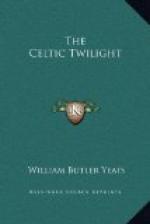One day I was dining with him when the servant-maid announced a certain Mr. O’Donnell. A sudden silence fell upon the old man and upon his two daughters. At last the eldest daughter said somewhat severely to her father, “Go and ask him to come in and dine.” The old man went out, and then came in looking greatly relieved, and said, “He says he will not dine with us.” “Go out,” said the daughter, “and ask him into the back parlour, and give him some whiskey.” Her father, who had just finished his dinner, obeyed sullenly, and I heard the door of the back parlour—a little room where the daughters sat and sewed during the evening—shut to behind the men. The daughter then turned to me and said, “Mr. O’Donnell is the tax-gatherer, and last year he raised our taxes, and my father was very angry, and when he came, brought him into the dairy, and sent the dairy-woman away on a message, and then swore at him a great deal. ‘I will teach you, sir,’ O’Donnell replied, ’that the law can protect its officers’; but my father reminded him that he had no witness. At last my father got tired, and sorry too, and said he would show him a short way home. When they were half-way to the main road they came on a man of my father’s who was ploughing, and this somehow brought back remembrance of the wrong. He sent the man away on a message, and began to swear at the tax-gatherer again. When I heard of it I was disgusted that he should have made such a fuss over a miserable creature like O’Donnell; and when I heard a few weeks ago that O’Donnell’s only son had died and left him heart-broken, I resolved to make my father be kind to him next time he came.”
She then went out to see a neighbour, and I sauntered towards the back parlour. When I came to the door I heard angry voices inside. The two men were evidently getting on to the tax again, for I could hear them bandying figures to and fro. I opened the door; at sight of my face the farmer was reminded of his peaceful intentions, and asked me if I knew where the whiskey was. I had seen him put it into the cupboard, and was able therefore to find it and get it out, looking at the thin, grief-struck face of the tax-gatherer. He was rather older than my friend, and very much more feeble and worn, and of a very different type. He was not like him, a robust, successful man, but rather one of those whose feet find no resting-place upon the earth. I recognized one of the children of reverie, and said, “You are doubtless of the stock of the old O’Donnells. I know well the hole in the river where their treasure lies buried under the guard of a serpent with many heads.” “Yes, sur,” he replied, “I am the last of a line of princes.”




